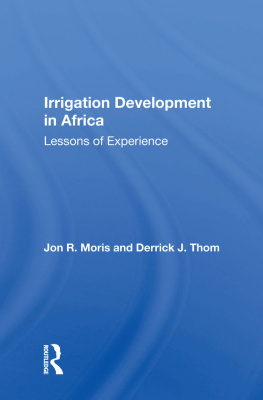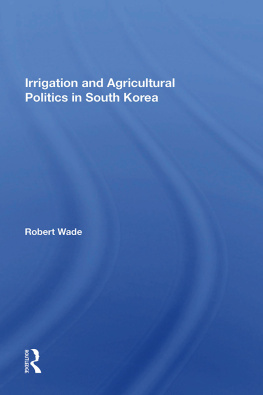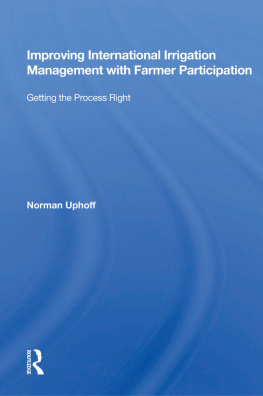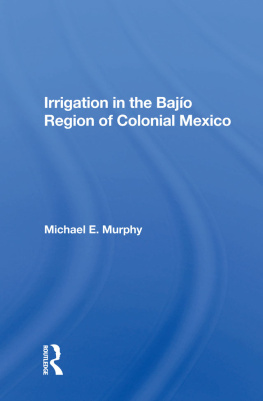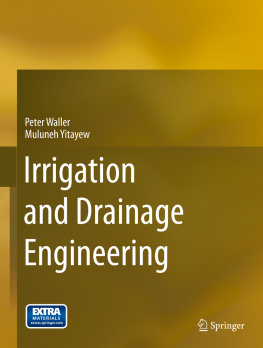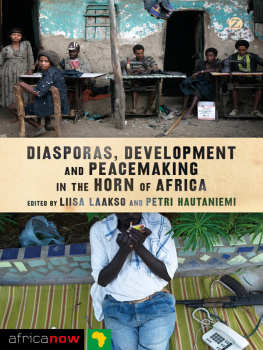Irrigation Development in Africa
Studies in Water Policy and Management
Charles W. Howe, General Editor
Irrigation Management in Developing Countries: Current Issues and Approaches, edited by K. C. Nobe and R. K. Sampath
Irrigation Investment, Technology, and Management Strategies for Development, edited by . William Easter
Improving International Irrigation Management with Farmer Participation: Getting the Process Right, Norman Uphoff
Water Markets in Theory and Practice: Market Transfers, Water Values, and Public Policy, Bonnie Colby Saliba and David B. Bush
Congress in Its Wisdom: The Bureau of Reclamation and the Public Interest, Doris Ostrander Dawdy
Irrigation Development in Africa : Lessons of Experience, Jon R. Moris and Derrick J. Thom
Social, Economic, and Institutional Issues in Third World Irrigation Management, edited by R.. Sampath and Robert A. Young (forthcoming)
Irrigation Development in Africa
Lessons of Experience
Jon R. Moris and Derrick J. Thom
First published 1990 by Westview Press, Inc.
Published 2018 by Routledge
52 Vanderbilt Avenue, New York, NY 10017
2 Park Square, Milton Park, Abingdon, Oxon OX14 4RN
Routledge is an imprint of the Taylor & Francis Group, an informa business
Copyright 1990 Taylor & Francis
All rights reserved. No part of this book may be reprinted or reproduced or utilised in any form or by any electronic, mechanical, or other means, now known or hereafter invented, including photocopying and recording, or in any information storage or retrieval system, without permission in writing from the publishers.
Notice:
Product or corporate names may be trademarks or registered trademarks, and are used only for identification and explanation without intent to infringe.
Library of Congress Cataloging-in-Publication Data
Moris, Jon R.
Irrigation development in Africa : lessons of experience / Jon R. Moris and Derrick J. Thom.
p. cm. -- (Westview studies in water policy and management)
ISBN 0-8133-7813-3
1. Irrigation---Africa, Sub-Saharan. I. Thom, Derrick J. II. Title. III. Series.
TC919.S73M67 1990
333.91'3'0967--dc20
89-32694
CIP
ISBN 13: 978-0-367-01332-5 (hbk)
To Dean F. Peterson,
whose career was dedicated to
irrigation development worldwide
Contents
, Charles W. Howe
, LINDEN F. VINCENT
, DONALD S. HUMPAL
, MARY TIFFEN
, THOMAS M. ZALLA AND JON R. MORIS
Contrary to still-popular impressions, much of sub-Saharan Africa is semi-arid and is dependent on the highly variable flows of major rivers. Aridity and flow variability early indicated the utility of large-scale water storage and irrigation projects. In the post-World War II period, the results of bilateral and multilateral aid for irrigation have been spotty at best, ranging from a few successes to several major catastrophes. Yet any hope for sustained economic growth depends on wise water management and some form of irrigation.
The present volume describes a significant subset of the African irrigation experience, from traditional flood recession systems to large projects like Gezira (Sudan) and Bura (Kenya). The authors analyze the key technical, socio-economic and institutional factions that have helped fashion success or failure and draw lessons for donors and host countries alike regarding future directions for irrigation assistance.
Irrigation Development in Africa: Lessons of Experience is a veritable encyclopedia of information on African irrigation and will serve as a valuable reference work for all researchers and policymakers seriously interested in the subject.
Charles W. Howe
General Editor
This study arose from USAID-financed research for the Water Management Synthesis II Project (WMS II), which published these findings for limited circulation under the title African Irrigation Overview (WMS II Report 37). We have somewhat abridged the main report to make its publication in this series feasible. The USAID grant (contract AID/DAN-4127-C-00-2096-00) provided for brief field visits by the senior authors to France, Mali, Niger and Zimbabwe. Support from other fortuitous sources enabled us to visit Rome, Sudan, Nigeria, Somalia, Tanzania, Malawi and Kenya; however, the bulk of our analysis rests upon published sources on African irrigation. Two institutions were especially helpful: The Overseas Development Institute and its Irrigation Management Network (under Mary Tiffen) in London, and the Food and Agriculture Organization's (FAO) Land and Water Division (under Peter Dielman) in Rome. We further record our deep indebtedness to those whose case studies were used liberally: Richard Miller (on Senegal), Bjorn Beckman and William Adams (on Nigeria), Tony Barnett and Gunar Srb (on Sudan), and Samuel Gitonga and Arja Vainio-Mattila (on Kenya). Our analysis drew also in particular upon the work of Jennie Dey, Paul Richards, Pat Fleuret and Masao Yoshida, among many others.
The two principal authors would like to express their thanks to the various participants involved in preparing the three-volume WMS II Report 37. Some joined in contributing their own chapters here, and with the timely assistance of Tom Zalla this massive research effort was finally completed. The size of the task and the consequent delays have taxed the friendship and patience of our supervisors and our families. Special thanks are owed to the WMS II team of Walt Coward, Dan Lattimore, Richard McConnen and especially Jack Keller of Utah State University. For funding the field research and initial publication we thank the USAID team (as it was then) of Worth Fitzgerald, Doug Merrey and Pat Fleuret. The product is not, perhaps, what they anticipated; any errors of fact or of interpretation remain our own responsibility. The senior author, Jon Moris, records his appreciation to London's Overseas Development Institute for great forbearance during the unfunded write-up period. Finally, we express our warm appreciation to JoAnn Biery, Janet Chambers, Carolyn Fullmer and Colette Yates for the tedious, behind-the-scenes effort to bring this large volume to press.
Jon R. Moris
Derrick J. Thom
Jon R. Moris is professor of anthropology in the Department of Sociology, Social Work and Anthropology at Utah State University.
Derrick J. Thom is professor and department head of the Department of Geography at Utah State University.
Charles W. Howe is professor of economics and director of the Environment and Behavior Research Program at the University of Colorado-Boulder.
Donald S. Humpal is agronomist with Development Alternatives, Inc., Washington, D.C.
Mary Tiffen is chair of the Agricultural Administration Unit and editor of the Irrigation Management Network at London's Overseas Development Institute.
Linden Vincent is a member of the School of Development Studies, University of East Anglia, Norwich, England.
Thomas M. Zalla is an economist and private consultant based in Fort Wright, Kentucky.
Irrigation Development in Africa
1
Introduction
The need for irrigation is commonly judged in relation to a country's climate: the adoption of irrigation being seen as a necessary (or "privileged") technological response to permit crop production under conditions of increasing aridity. Irrigation potential is, on the other hand, determined by the availability of water near suitable soils. The two need not coincide. A major observation about tropical Africa is that here they often do not ; the nations with the greatest potential for future irrigation development are not necessarily the countries with the greatest present needs. Where irrigation need and potential coincide--as along the Senegal and Niger rivers in West Africa or the Nile in the Sudan--a substantial development of irrigated agriculture has already occurred.


